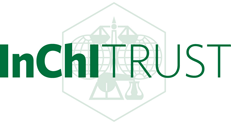Welcome to the InChI Trust Website
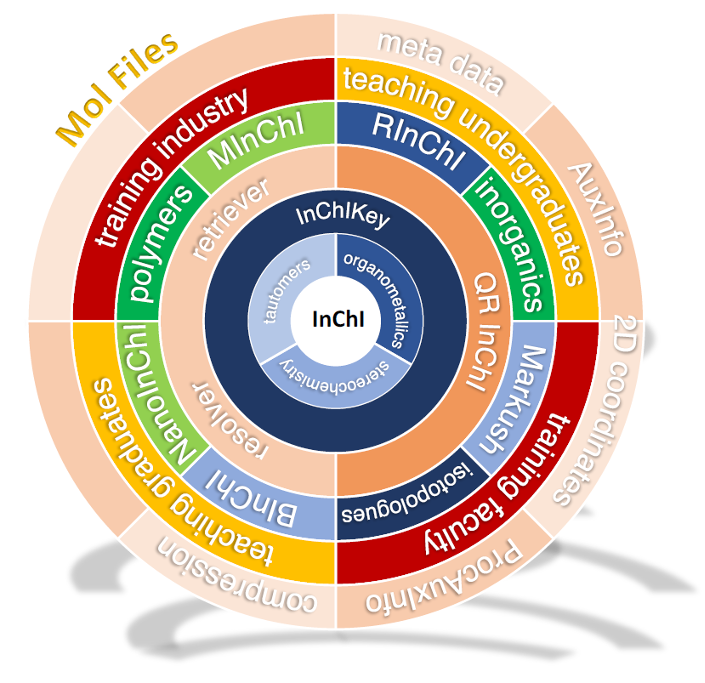
PRECISION FDA CHALLENGE: Crowdsourced Evaluation of InChI-based Tautomer Identification
The InChI Trust, the IUPAC Working Group on Tautomers, and the U.S. FDA call on the scientific community dealing with chemical repositories/data sets and analytics of compounds to test a modified InChI algorithm. The modified InChI was designed for advanced recognition of tautomers, against real chemical samples. Challenge Time Period: November 2022 – March 2023. CLICK HERE for more information.
Quick Links
InChI Related Publications
InChI
The International Chemical Identifier
InChI is a character string generated by computer algorithm, originally developed by the International Union of Pure and Applied Chemistry (IUPAC). InChI is a Standard Identifier for chemical databases and is essential for 21st century communication, enabling effective information management across chemistry.
IUPAC Division VIII established the InChI Subcommittee to develop the scientific rules for representing defined chemical structures, initially focusing on organic molecules. For other aspects of chemical structures (tautomers, inorganic, organometallic, etc.), the Subcommittee has established Working Groups to extend the Standard to additional areas of chemistry. The conceptual design and direction is decided by the IUPAC Working Groups which are made up of experts in the associated fields. More information on the Working Groups is available here.
InChI with its associated InChIKey were developed as a non-proprietary and open international standard. The InChI algorithm turns chemical structures into unique machine readable strings. InChI and InChIKEY are used for describing, storing and searching chemical structures and all of the associated software components are non-proprietary and open source.

The InChI Trust
The InChI Trust is a UK charity that oversees the implementation and new rules developed and approved by IUPAC through the Working Groups. The Trust aims to further expand the use the InChI standard with extended chemical and computational capabilities. The Trust also promotes the use of the InChI algorithm.
A broad community of scientists and developers continues to extend the InChI Standard. Much of this effort is contributed by our sponsors and supporters. Contact any of them or reach out directly to us at the InChI Trust for more information or with any questions.
What is InChI and InChI KEY?
InChI is a structure-based identifier, strictly unique, and non-proprietary, open source and freely accessible.
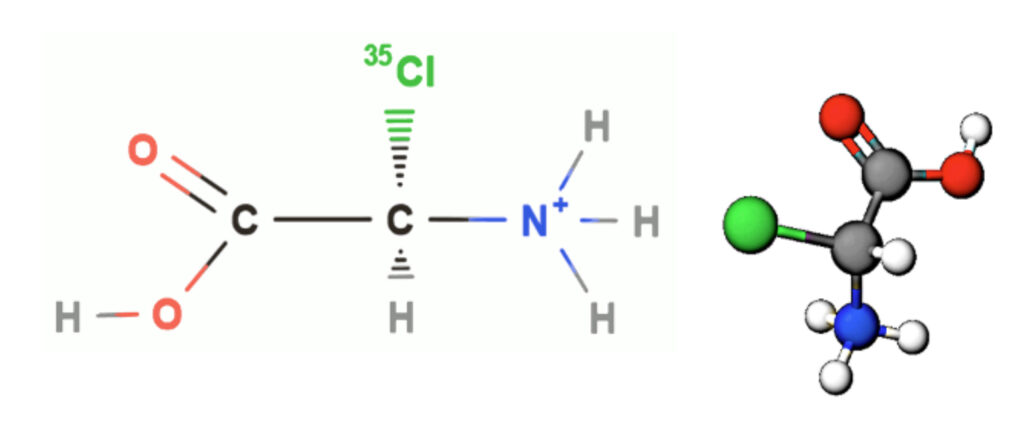
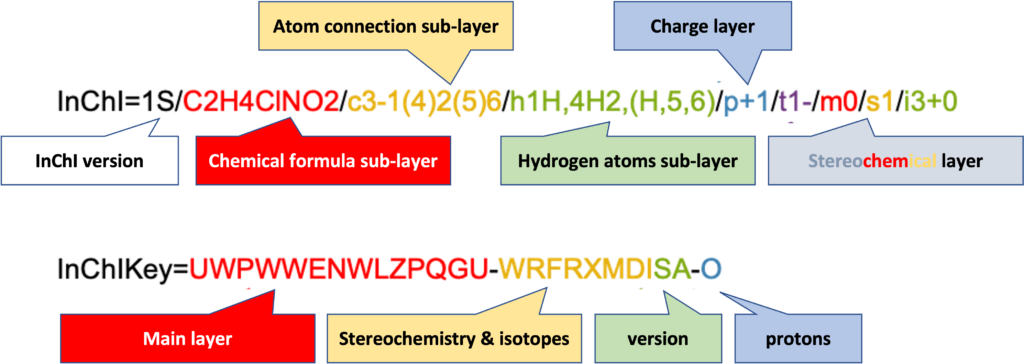
InChIKey is a hashed version of InChI which allows for a compact representation and for searching in standard search engines like Google.
For more about the InChI standard CLICK HERE. See also our Wikipedia article.
Latest InChI News (View All InChI News)
Catch up on progress and plans for InChI (April 21, 2024)
We held an online update on InChI on 26th March, covering current status and future roadmap for the standard:
Technical Update
InChI Subcommittee / Working Group Update
InChI Trust Organisational Update
IUPAC CPCDS Update
View the recording: (Passcode: 2%9QJ%+y)
InChI Project Update for 2024 (January 7, 2024)
In 2021-2023, the InChI Trust decided to significantly invest in creating additional roles for outreach and technical direction – spending from our reserves to accelerate InChI development and transition this to a more open and transparent model. This was followed by the sad passing of Igor Pletnev, our primary developer, in late 2021.
Since then, much progress has been made transitioning the existing code to a GitHub environment, developing additional understanding of the code, fixing bugs and creating testing protocols that build on previous practice. This work has taken place at RWTH Aachen, supported by the NFDI4Chem project and the Volkswagen Foundation. The next ‘new’ version of InChI – rebuilding of the current version 1.06, cleaned-up and with additional bugfixes, is in testing and will be available for the IUPAC InChI Subcommittee and CPCDS to approve soon. The code now lives on GitHub – we are also working through the governance needed for this new development model aligned with IUPAC.
In parallel, much has been achieved by the Working Groups and the IUPAC InChI Subcommittee in agreeing the scientific requirements for extensions of the standard, and for implementation investigations to inform our technical roadmap.
The roadmap below covers both extensions to core InChI, and to InChI applications (RInChI, MInChI, the web demo and the resolver). Additional Working Groups are still considering their requirements.
In addition to the development resource at RWTH Aachen, we will also be supported by cheminformatics expertise from a new position at the Beilstein Institute. The InChI Trust is very grateful for this in-kind support from these organisations, and partnerships such as these are a fantastic way to achieve step-changes in speed of delivery, building on the core financial support from the Trust’s members, and input from IUPAC’s expert volunteers.
Having drawn on our reserves to catalyse these activities, the Trust now needs to reduce its annual spend so this is covered by core revenue. Given the focus on the technical roadmap for 2024-2025, we have prioritised our support towards technical oversight, coordination and planning. As a result we are reducing the support for roles in other areas. This refocus will enable us to deliver enhancements to InChI that have been long desired by our user community and grow partnerships and member contributions that will support further scientific activities to push the standard forward.
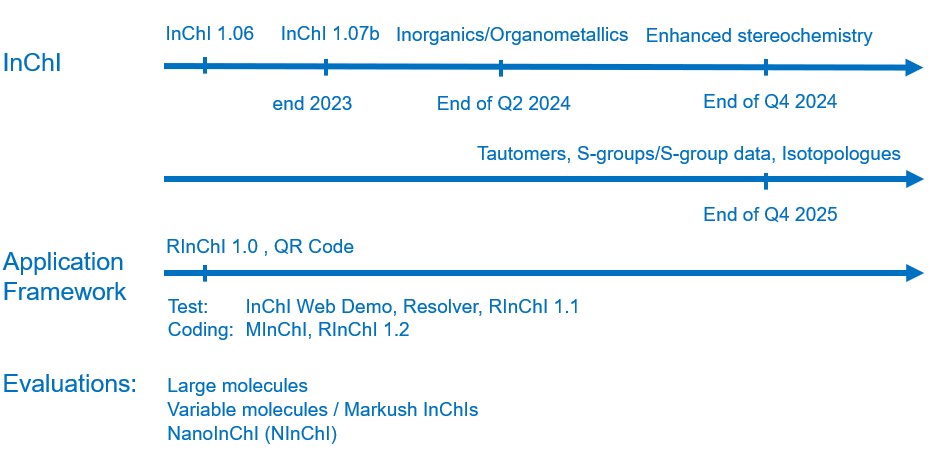
InChI Poster at the CODATA Meeting in Salzburg Oct 23-26, 2023 (October 23, 2023)
Gerd Blanke presented a poster at the CODATA Meeting in Salzburg, Austria, the week of October 23, 2023. He highlighted new additions to the InChI Standard that are in development and coming soon in the next release. Poster here.
Where are InChI and InChI Key Used?
InChI is used by most of the large chemical databases and software applications handling many millions of chemical structures.
InChI enables the linking and interlinking of chemistry and chemical structures on the web and computer platforms. By enhancing the discoverability of chemical structures, InChI advances the ‘FAIR Guiding Principles for scientific data management and stewardship’. FAIR was published in 2016 to provide guidelines to improve the Findability, Accessibility, Interoperability, and Reuse of digital assets. InChI provides ‘Findability’ for chemical structures and extends Interoperability between platforms, both of which foster Accessibility and Reuse!
InChIKEY Implemented in Google
Google has implemented the ability to use an InChIKEY for queries. An InChIKEY can simple be embedded in a Google query and it will be used by Google to query for information on that specific chemical.
Google has implemented the ability to use an InChIKLEY for queries. An InChIKEY can simple be embedded in a Google query and it will be used by Google to query all the information related to that chemical structure. This includes most patents and a broad set of additional chemical databases.
related to that chemical structure. This includes most patents and a broad set of additional chemical databases.
InChI_Trust Twitter Feed
[custom-twitter-feeds screenname=”inchi_trust” num=3]
